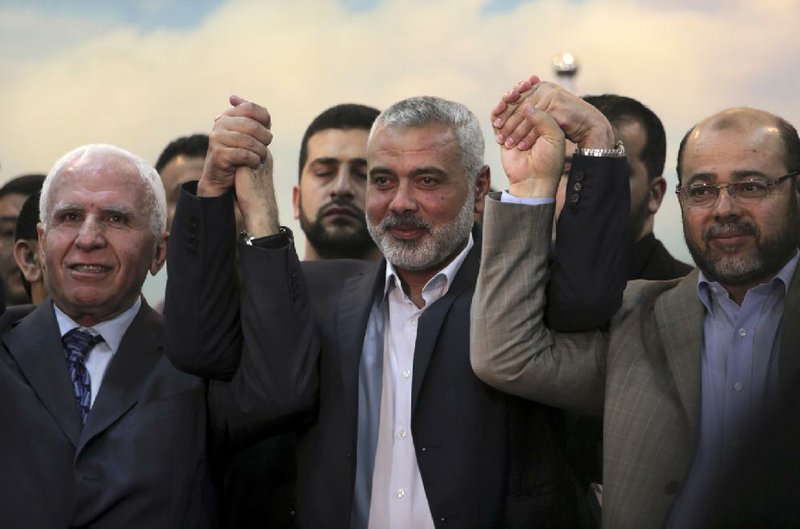GAZA CITY, Gaza Strip - The two main Palestinian factions announced an agreement Wednesday to heal a seven-year schism and form a unity government within five weeks that would prepare for Palestinian elections six months later.
The two groups - the Palestine Liberation Organization, which runs the Palestinian Authority in the West Bank, and Hamas, the militant Islamist group that controls the Gaza Strip - have reached similar accords before that were never carried out.
The latest deal was reached as the fragile U.S.-brokered peace efforts between the Palestinians and Israel are approaching Tuesday’s deadline without a resolution in sight. People familiar with the discussions have said the Israeli and Palestinian sides were far apart even on how to extend the talks past the deadline.
Ismail Haniyeh, the prime minister of the Hamas government in Gaza, said at a news conference in Gaza City, “I announce to our people the news that the years of split are over.”
Israel responded to the announcement by canceling a meeting among the peace negotiators that was scheduled for Wednesday night. An Israeli with knowledge of the talks said that though it was not yet clear how the reconciliation would ultimately affect the talks, “it introduces a huge complication” at a critical juncture and “takes the winds out of the sails.”
Before the announcement, Prime Minister Benjamin Netanyahu of Israel warned Mahmoud Abbas, the president of the Palestinian Authority and leader of Fatah, the main group in the PLO, against reconciling with Hamas, which refuses to recognize Israel and which Israel considers a terrorist group.
“Does he want peace with Hamas or peace with Israel?” Netanyahu asked. “You can have one but not the other. I hope he chooses peace. So far he hasn’t done so.”
Adding to the volatile atmosphere, Israel carried out an airstrike in the northern Gaza Strip on Wednesday, around the time the deal was being announced. The Health Ministry in Gaza said 12 Palestinians were wounded, including two children. Al Aqsa Martyrs Brigades, the armed wing of Fatah, said a group of its members in the town of Beit Lahiya were the target. The Israeli military said it had mounted a “counterterrorism operation” but gave no specifics about the target.
Analysts remained skeptical about whether the Palestinian reconciliation efforts would lead to tangible changes, because neither Fatah nor Hamas has shown interest in genuine power-sharing in the past, and they have deep differences over how to deal with Israel.
But Gaza under Hamas has been severely weakened by an Egyptian crackdown on the smuggling tunnels along the Gaza-Egypt border and an Israeli blockade. And Abbas has faced growing criticism from West Bank residents about the negotiations with Israel and his own legitimacy, with Palestinian elections long overdue. He has threatened to dissolve the Palestinian Authority, which exercises limited self-rule in the West Bank, if the talks with Israel end in failure.
Among other things, the text of the reconciliation calls for Abbas to begin talks immediately to form a joint Palestinian government and set a date for elections. A president, parliament and the PLO’s National Council are to be elected at the same time.
The two factions also agreed to activate a temporary leadership committee of the PLO with the intention of opening the way for Hamas and another militant group, Islamic Jihad, to join the organization.
The political schism between the factions has been deeply unpopular among ordinary Palestinians, not least because it split the West Bank from Gaza, the largely poor and isolated Palestinian coastal territory.
The rivalry peaked after Hamas won the Palestinian elections of 2006, defeating Fatah. A year later, after a failed unity government and a brief but bloody factional war, Hamas took full control of Gaza, routing the forces loyal to Abbas, leaving him with authority only in the West Bank.
“The president in Ramallah needs to unite his people,” said Ziad Abu Amr, a deputy prime minister of the Palestinian Authority government and a close aide to Abbas. “It’s a psychological and national issue that Palestinians feel they are united. This split is hurting them.”
Abu Amr, who was not participating in the reconciliation talks, dismissed Netanyahu’s warnings as a “double standard,” noting that Abbas had agreed to the current peace talks despite the extreme rightist views of some members of the Israeli Cabinet.
“This is arrogance, this is colonial, they should stop insulting the Palestinians and threatening them,” Abu Amr said. “Nobody has the right, including Netanyahu, to stop Palestinians from reuniting their people and their country.”
He said the Egyptian government was facilitating the reconciliation talks and had allowed Moussa Abu Marzouk, a senior Hamas official, to enter Gaza from Egypt through the Rafah border crossing.
Information for this article was contributed by Jodi Rudoren of The New York Times.
Front Section, Pages 6 on 04/24/2014

